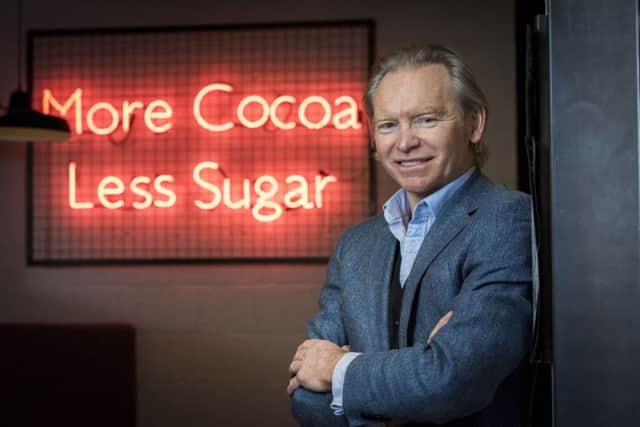Leaders of a chocolate revolution have their tactics right


Hotel Chocolat is a good example. It charges higher prices than other chocolate brands, but customers see that as a fair trade off because of its views on treating cocoa farmers fairly, reducing the sugar content of chocolate and its insistence on quality.
So why is Yorkshire a key area for expansion for the luxury chocolate brand? CEO Angus Thirlwell said: “People say Yorkshire people are very canny. Yes they are, but when they find something high quality they are immensely loyal. If you’re all style and no substance, Yorkshire people are particularly attuned at seeing through it.”
Advertisement
Hide AdAdvertisement
Hide AdHotel Chocolat said its Father’s Day campaign, ‘Better Than Socks’, performed particularly well.
“Humour is a very important part of the brand,” said Mr Thirlwell. “We are a British chocolate brand.
“We are doing things in a very British way. You don’t see humour in high end French chocolate.”
He says the group has never played by the rules of what people think a chocolate company should be.
Advertisement
Hide AdAdvertisement
Hide Ad“For one thing, we’re one of the world’s few chocolate makers to actually grow cocoa, on our Rabot Estate plantation in Saint Lucia.”
The aim of entrepreneurs Angus Thirlwell and Peter Harris was “to start a revolution in British chocolate”.
“It’s been a dynamic period of change and growth, but everything we do is still guided by the three basic values that we started with,” said Mr Thirlwell.
“We believe in originality – being fresh, creative and innovative, and always one surprising step ahead. Brits are really good at design and innovation.
Advertisement
Hide AdAdvertisement
Hide Ad“Our products look and feel different to French, Italian or Swiss chocolate.”
The second principle is authenticity.
“It’s about keeping it real. We grow some of the cocoa we use. Cocoa is the number one ingredient. That’s really unusual as usually it’s sugar.”
The third is ethics – how to go about business in an ethical, sustainable way.
“We believe in reconnecting our love of chocolate with its roots. Cocoa farmers worldwide deserve respect and a fair deal. That’s what we offer, from Saint Lucia to Ghana, through our Engaged Ethics programme.”
Advertisement
Hide AdAdvertisement
Hide AdThe cocoa plantation in St Lucia is part of this ethical principle. Mr Thirlwell read a 1920s book about cocoa plantations and he discovered that 100 years ago there was a much stronger relationship between chocolate brands and cocoa growers.
“Cocoa growers are impoverished now, but 100 years ago it was very different,” he said. “Today, consumers know nothing about cocoa and farmers know nothing about chocolate.”
That was when Thirlwell and Harris decided to buy a plantation in St Lucia.
“We want to raise the status of cocoa growing to grape growing,” said Mr Thirlwell.
Advertisement
Hide AdAdvertisement
Hide AdAnother brand that can get away with charging high prices because of its integrity is luxury fashion brand Burberry. Like Hotel Chocolat it sees the value of staying true to your roots and all of its classic trench coats are made in Yorkshire.
The site in Castleford is no high street sweat shop. Burberry employs hundreds of skilled workers who stitch 5,000 heritage trench coats a week.
Their stitching skills take a year to hone and Burberry is hoping to persuade its 800 workers in Castleford and Keighley, where the gabardine fabric is woven, to move to its new £50m state-of-the-art manufacturing and weaving facility in Leeds, which is due to be completed in 2019.
Burberry relies on Yorkshire expertise and graft to maintain its brand credentials. When something is made in Yorkshire, it is usually seen by the rest of the UK and the world as a guarantee of integrity and value.